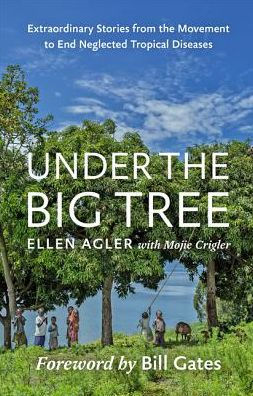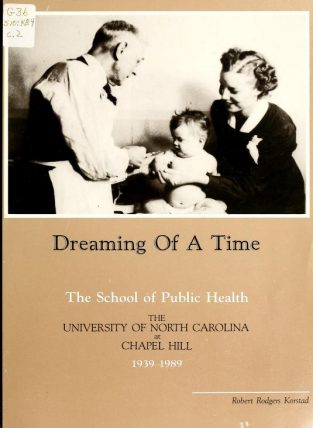Eliminating neglected tropical diseases (NTDs)
A little more than 100 years ago, North Carolinians were plagued by hookworm, one of a group of neglected tropical diseases (NTDs) that affect more than one billion people annually worldwide.
Related Posts
 In the early 1900s, sanitation was poor, as it is still today for billions around the world. Many thousands of people in NC lacked running water and sanitary privies/latrines, whether indoors or in outhouses; as a result, it was common for people to defecate in fields and bathe infrequently. In these conditions, hookworm became endemic. As Ellen Agler, chief executive officer of The END Fund, described in her new book, Under the Big Tree: Extraordinary Stories from the Movement to End Neglected Tropical Diseases, “A heavy hookworm load is a disaster for the human host, who loses vital amounts of iron and protein through the blood ingested by the worms.” Hookworm infestation can stunt children’s physical and cognitive growth and cause profound lethargy in children and adults, with vast repercussions for economic growth. And this is just one of a group of NTDs that have devastating, although not usually lethal, effects on humans.
In the early 1900s, sanitation was poor, as it is still today for billions around the world. Many thousands of people in NC lacked running water and sanitary privies/latrines, whether indoors or in outhouses; as a result, it was common for people to defecate in fields and bathe infrequently. In these conditions, hookworm became endemic. As Ellen Agler, chief executive officer of The END Fund, described in her new book, Under the Big Tree: Extraordinary Stories from the Movement to End Neglected Tropical Diseases, “A heavy hookworm load is a disaster for the human host, who loses vital amounts of iron and protein through the blood ingested by the worms.” Hookworm infestation can stunt children’s physical and cognitive growth and cause profound lethargy in children and adults, with vast repercussions for economic growth. And this is just one of a group of NTDs that have devastating, although not usually lethal, effects on humans.
The story of Under the Big Tree converges with the history of North Carolina and our school. In 1909, as the book recounts, a landmark public health effort was initiated in the United States, the Rockefeller Sanitary Commission for the Eradication of Hookworm in the South. Agler went on to explain that, prior to formation of the World Health Organization (WHO) in 1946, the Commission was the most important public health effort in the US. The aim was to eradicate hookworm, which affected about 40 percent of children in the areas where hookworm was endemic. The RSC used mostly what we would now regard as traditional health education methods—silent films, lectures, news articles and similar approaches—to educate people about how to prevent hookworm and other diseases. Today, many of these methods still are used in the LMICs (although silent movies have been replaced), along with mobile devices and digital interfaces.
 Dreaming of a Time, the 50-year history of the UNC School of Public Health, from 1939 – 1989, now the Gillings School, tells the story of how interest and investment in public health within North Carolina grew out of early efforts to control hookworm and other preventable diseases. The birth of our school 80 years ago owes much to disease prevention efforts spurred by the RSC, and the commitment of NC leaders to invest in the health of its people. North Carolina became one of the nation’s public health leaders.
Dreaming of a Time, the 50-year history of the UNC School of Public Health, from 1939 – 1989, now the Gillings School, tells the story of how interest and investment in public health within North Carolina grew out of early efforts to control hookworm and other preventable diseases. The birth of our school 80 years ago owes much to disease prevention efforts spurred by the RSC, and the commitment of NC leaders to invest in the health of its people. North Carolina became one of the nation’s public health leaders.
While there are many examples of the benefits of attacking the cluster of diseases referred to as Neglected Tropical Diseases (NTDs), as the book demonstrates through data and stories, tropical diseases often were neglected because, while they caused tremendous morbidity, they weren’t major killers. They caused a cycle of poverty and low education (with girls dropping out of school to care for family members) that held entire countries back. Slow progress was made against NTDs and vaccinations and treatments became available. Recent data showed that deworming led to a 25 percent increase in school participation at a cost of $3.50 per additional year of school — a very good value (loc. 1160*). Overall, “Treating NTDs is a best-buy for global health. It is inexpensive and yields many kinds of return: educational, medical, financial and moral.” (1349*) Returning to the RSC, the authors of Under the Big Tree wrote that the Rockefeller Sanitary Commission saw itself as making an investment and not performing charity. This was a particularly enlightened way of seeing things more than 100 years ago. The RSC said, “The time will come when (the people) will demand clear-cut evidence of (the country health work’s) value just as stockholders in a company will demand dividends on investments.” (1361*) That time is now.
Effective interventions without a roadway
Under the Big Tree and much research have shown that effective interventions cannot achieve population impact if they don’t reach people who will benefit. The book tells of contemporaneous rural areas of African countries with no passable roads, where there literally was no way to get drugs from point A to point B without herculean efforts. In many cases, pharmaceutical companies had donated millions of dollars’ worth of vaccines and medicines, but many failed to reach their targets. Cost of the drugs was small — 50 cents per person in recent dollar terms — to prevent diseases such as intestinal worms and schistosomiasis, and most of the costs were in delivery (1849*). Sometimes, efforts failed when program planners hadn’t anticipated all the steps that must occur after drugs become available. Sometimes, drugs and vaccines were stolen or diverted, weren’t the right formulation or required refrigeration. As a school, we’ve put a lot of emphasis on implementation, and what the Gates Foundation refers to as the “last mile” of getting effective interventions to the people who need them. The best interventions will not achieve desired effects if implementation is not considered.
There are effective interventions and impressive success stories, many told in the book, including those led by William Foege, director of the US Centers for Disease Control and Prevention (CDC) from 1977 – 1983. Still, delivery is a huge problem we have not solved in the US and globally, and far too little research funding goes to implementation. It is not solely a public health problem and won’t be solved by public health practitioners working in isolation. It takes advocacy, investment and a lot of innovation involving multi-sector partnerships and coalitions. But it is possible. We can change many conditions and diseases when we decide to do so. Getting water to millions, preventing AIDS and NTDs, curing more cancers: we can do these things, and we should. At Gillings, we’re on it, but we can’t do it alone.
Barbara
*Location number in Kindle edition of Under the Big Tree: Extraordinary Stories from the Movement to End Neglected Tropical Diseases.
The views expressed in this blog are Barbara Rimer’s alone and do not represent the views and policies of The University of North Carolina or the Gillings School.

